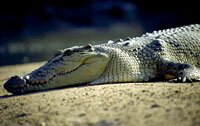 |

|
 FAQ CONTENTS 0. CREDITS 1. CONTENTS 2. INTRODUCTION 3. SPECIES 4. PURCHASING 5. HOUSING 6. FEEDING 7. HANDLING 8. HEALTH CARE 9. MISCELLANEOUS 10. APPENDICES |
Crocodilian Captive Care Frequently Asked Questions Release 1.2 [in progress], last updated February 2003 updated: Introduction [entire section rewritten and updated], Species [in progress] contents | credits  FOREWORD FOREWORDCrocodiles, alligators and caimans are not the first creature you would bring to mind when considering a suitable pet for the home. For most people, the word "crocodile" evokes images of wildebeest being dragged helplessly from the riverbank, unable to escape from the powerful jaws of their assailants whose teeth cut through flesh and crush bone with unmatched ferocity. Who would want the biblical Leviathan as a pet? This is a creature that cannot fetch your slippers, has no desire to curl up on your lap, and would just as soon as bite the hand that feeds it. In recent years, however, smaller crocodilians such as spectacled caimans have become available through the pet trade. With gently smiling jaws and large, round eyes, baby caimans seem a world apart from the wildebeest-snatching Nile crocodiles we see in natural history films. Their appealing eyes coupled with persuasive pet store talk ensured that they captured the hearts of pet shop visitors several years ago and the trend continues today. However, there has been virtually no accurate information available on the captive husbandry of these creatures, and nothing to advise potential owners on whether they make suitable pets in the first place. As a result of misinformation, we now see far too many caimans and other crocodilians being neglected, dumped and otherwise disposed after only a year or two of their lives - normally when the animal really starts to bite very hard. Yet despite this, a steadily growing group of dedicated crocodilian keepers has emerged. This document is a serious attempt to make useful and accurate information available on the captive care of crocodilians. Such information needs to have two goals. First, it has to make people realise exactly what keeping a crocodilian entails, and therefore serve to dissuade all but the most dedicated and resourceful. Secondly, it must be useful to serious crocodilian keepers, providing information on all aspects of crocodilian husbandry to enhance their animals' health and longevity. Although this document refers primarily to caimans (specifically the spectacled caiman), information found here is applicable to all 23 crocodilian species. Despite their geographical range, their morphological and behavioural differences, all crocodilians have very similar basic husbandry requirements. Where there are differences, these are discussed in the relevant section, and there is also a short description of the most commonly kept species. This manual contains input from a number of experienced crocodilian keepers, biologists and vets. It will continue to evolve over time as more information is added, but even now it provides the most detailed guide on caiman and other crocodilian care written in English. Information includes which species make the best captives, how to select a healthy animal, the complexities of building a suitable habitat, the facts about correct and incorrect diets, how to handle a crocodilian safely, major health care issues, appendices listing suitable vets, wildlife agencies for permits, and more. The index details both the current and future contents, and if you have any comments or requests on the future direction of this care guide, please contact the . Please take a few seconds to check out the credits below. This document would not have been possible without everyone's invaluable input, and I thank them all. Adam Britton CREDITS Written and edited by Contributions by (in alphabetical order) Additional thanks to , , John P. Levell, , Bill Moss, Boyd Simpson, Luke Toms, Text copyright (C) 1999-2001 by Adam Britton. All Rights Reserved. Duplication for commercial purposes is prohibited without the expressed permission of the author. Duplication for non-profit purposes is possible with the permission of the author. No part of this document may be altered in any way. contents | foreword |
return to: crocodilian.com | species list | biology database | communication | croc links

Design & content by Adam Britton ? 1995-2011 [email]
CROCODILIAN VISITORS
SINCE 5TH MARCH 1996